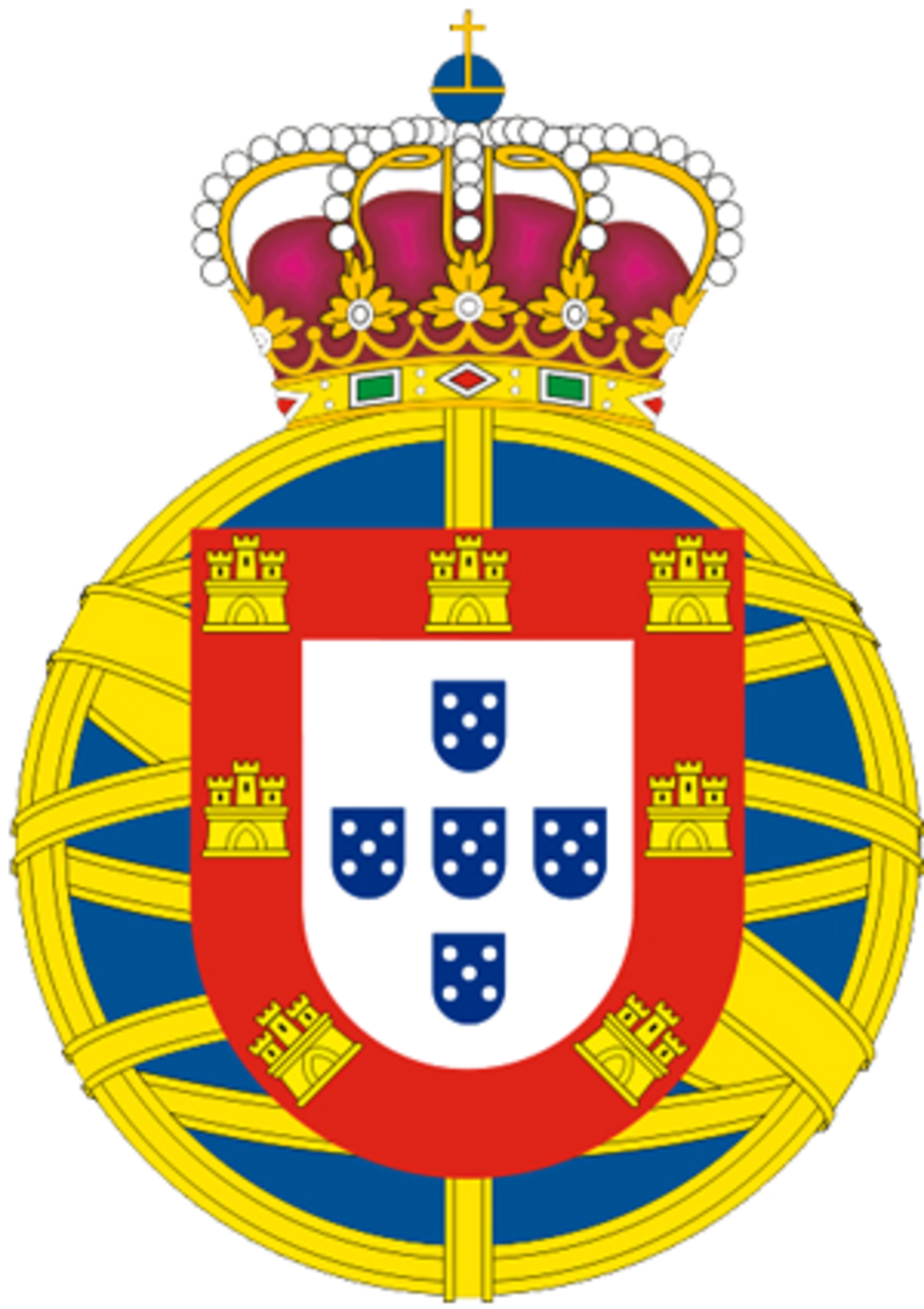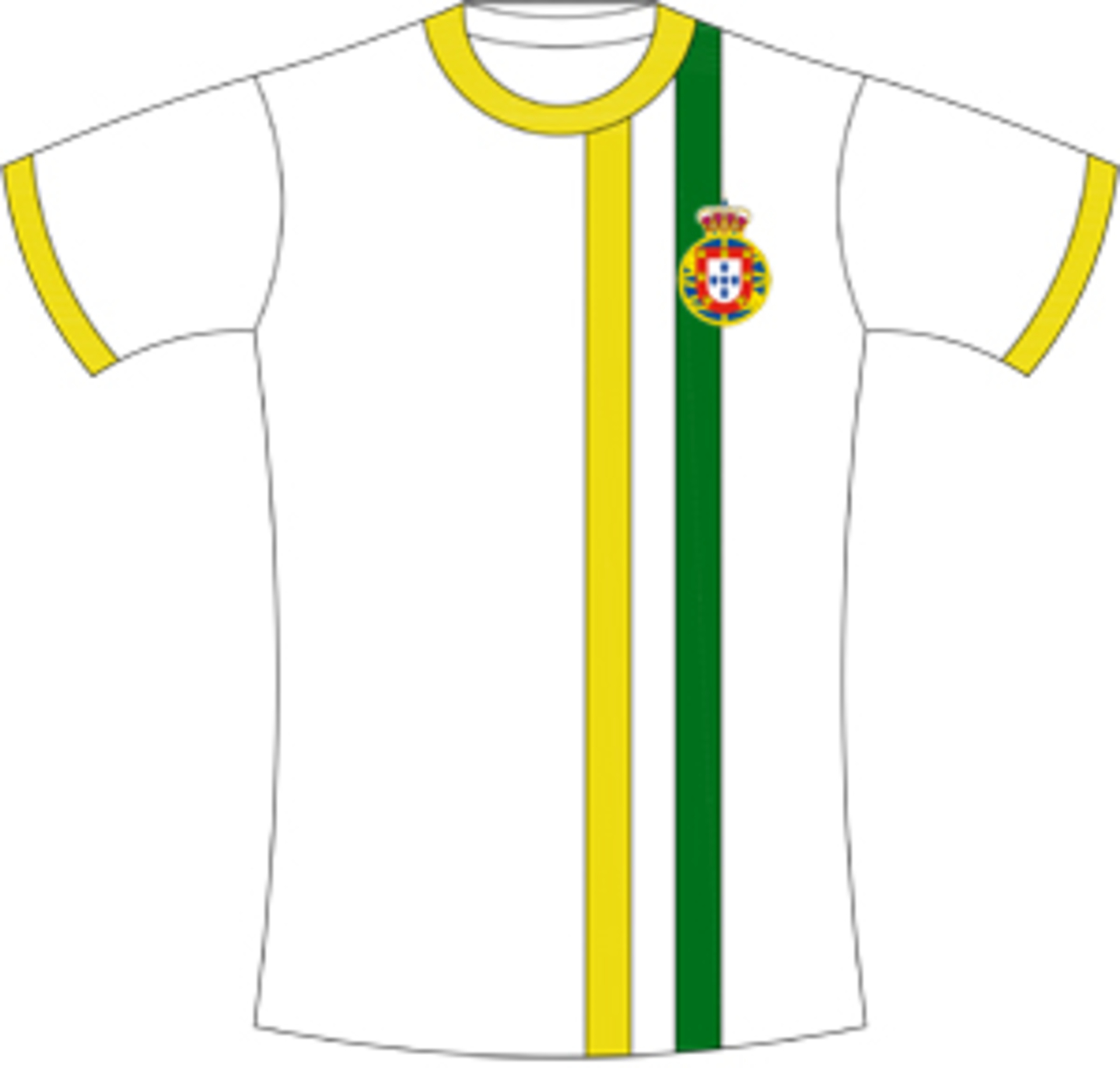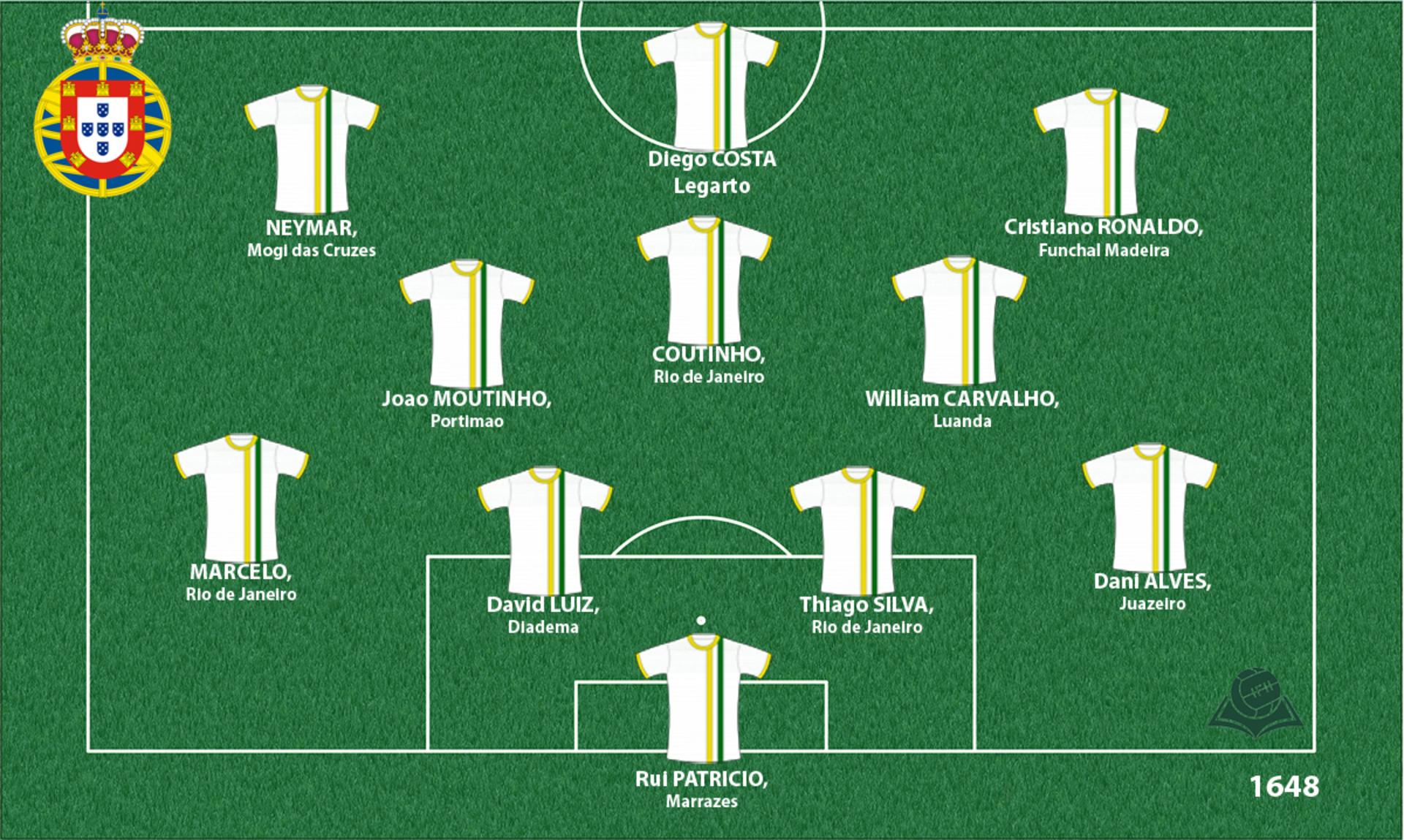Portuguese Empire
Portugal could have easily become a constituent of Spain in 1580, as happened to Galicia, Navarra, Catalonia, Aragon, and other states of the Pyrenees Peninsula. However, the occurrences in 1640, as the future would prove, made such a turn of events forever impossible. The founding of an overseas colonial empire, together with centuries-long wars against Castile, which finally ended in 1640, influenced the strengthening of the consciousness of belonging to a single state – Portugal.

Coat of arms

Shirt
| Position | First name | Last name | Mjesto rođenja | Like | Dislike | |
|---|---|---|---|---|---|---|
| GK | ALISSON | Becker | Novo Hamburgo |
2 |
0 |
|
| GK | Rui | PATRICIO | Marrazes |
5 |
0 |
|
| GK | Santana de Moraes | EDERSON | Sao Paulo |
1 |
0 |
|
| DC | David | LUIZ | Diadema |
1 |
0 |
|
| DC | Kepler Laveran de Lima Ferreira | PEPE | Maceió |
1 |
0 |
|
| DC | Marcos Aoás Corrêa | MARQUINHOS | Sao Paulo |
2 |
0 |
|
| DC | Thiago | SILVA | Rio de Janeiro |
6 |
0 |
|
| DRL/MR | Nelson | SEMEDO | Lisbon |
7 |
0 |
|
| DR | Dani | ALVES | Juazeiro |
1 |
0 |
|
| DR/MR | Joao | CANCELO | Setubal |
2 |
1 |
|
| DL | Alex | SANDRO | Catanduva |
1 |
0 |
|
| DL | Filipe | LUIZ | Jaraguá do Sul |
1 |
0 |
|
| DL | Vieira da Silva Júnior | MARCELO | Rio de Janeiro |
7 |
1 |
|
| DMC | Carlos Henrique | CASEMIRO | São José dos Campos |
6 |
0 |
|
| DMC | Fábio Henrique Tavares | FABINHO | Campinas |
1 |
0 |
|
| DMC | William | CARVALHO | Luanda |
1 |
0 |
|
| MC | Joao | MOUTINHO | Portimao |
6 |
0 |
|
| MC | José Paulo Bezerra Maciel Júnior | PAULINHO | Sao Paulo |
1 |
0 |
|
| MC | Renato | SANCHES | LISBON |
10 |
3 |
|
| AMC | OSCAR | dos Santos Emboaba Júnior | Americana |
0 |
1 |
|
| AMC | Phillipe | COUTINHO | Rio de Janeiro |
5 |
2 |
|
| AMRLC | Bernardo | SILVA | Lisbon |
11 |
0 |
|
| AMRL | Borges da Silva | WILLIAN | Ribeirão Pires |
1 |
0 |
|
| AMRL | Douglas | COSTA | Sapucaia do Sul |
1 |
0 |
|
| AMRL | Gelson | MERTENS | Praia |
0 |
0 |
|
| AMRL | Gonacalo | GUEDES | Benavente |
8 |
0 |
|
| AMRL | LUCAS | Moura | São Paulo |
0 |
0 |
|
| FRLC | Cristiano | RONALDO | Funchal Madeira |
10 |
0 |
|
| FRLC | da Silva Santos | NEYMAR JR. | Mogi das Cruzes |
7 |
2 |
|
| FRLC | Gabriel | BARBOSA | São Bernardo do Campo |
0 |
0 |
|
| FRLC | Gabriel | JESUS | Sao Paulo |
2 |
0 |
|
| FRLC | Roberto | FIRMINO | Maceió |
1 |
0 |
|
| FC | Diego | COSTA | Legarto |
0 |
0 |
(Today part of: Portugal, coastal Brasil)
The Portuguese throne was taken by the king of Spain in 1580, after the Aviz dynasty had died out. He sat it until 1640, when Portuguese nobility and clergy in the north of the country rebelled against him, because Spanish kings did not keep their promise that they would uphold the laws and customs which guaranteed Portugal’s autonomy, whereas all decisions were made in Madrid. However, out their own interests, trade and Inquisitional circles were not inclined to support the separation (or the return of independence), and the pope himself claimed that the Portuguese political independence was connected with the Protestant religious independence, which had spread in Northern Europe at the time, although Portugal had always been one of the most conservative Catholic parts of Europe. Of course, the pope did not dare to antagonise Spain, the greatest of the remaining Catholic powers. Nevertheless, the rebellion succeeded, in most part because of the preoccupation of Castile with the snuffing out of resistance in Catalonia, and the war against France.
However, Portugal would soon have to pay for its independence by coming under military protection of Great Britain, becoming, to a certain extent, its vassal state. The consciousness of belonging,as well as that of the necessity for belong to a single state (Portugal), was achieved more through great geographical discoveries than through the close connection between the crown and religion in opposing those who are different, as was the case with, for instance, Spain. Also, centuries of wars against Castile created a deep antagonism between the Portuguese and their neighbours on land. When, at the end of the 17th century, gold was found in Brazil, the state treasury was filled once again, and this was followed by a period of spectacular flaunting of wealth, where the Church, the crown, and the nobility competed against each other in building chapels and palaces gilded with Brazilian gold.
Sources
- David BIRMINGHAM, Povijest Portugala, Zagreb, 2004.
- Grupa autora, Povijest: Humanizam i renesansa, doba otkrića, knjiga VIII., Zagreb 2008.
- Grupa autora, Povijest: Doba apsolutizma (17. stoljeće), knjiga X., Zagreb 2008.
- Grb: https://en.wikipedia.org/wiki/Coat_of_arms_of_Portugal
